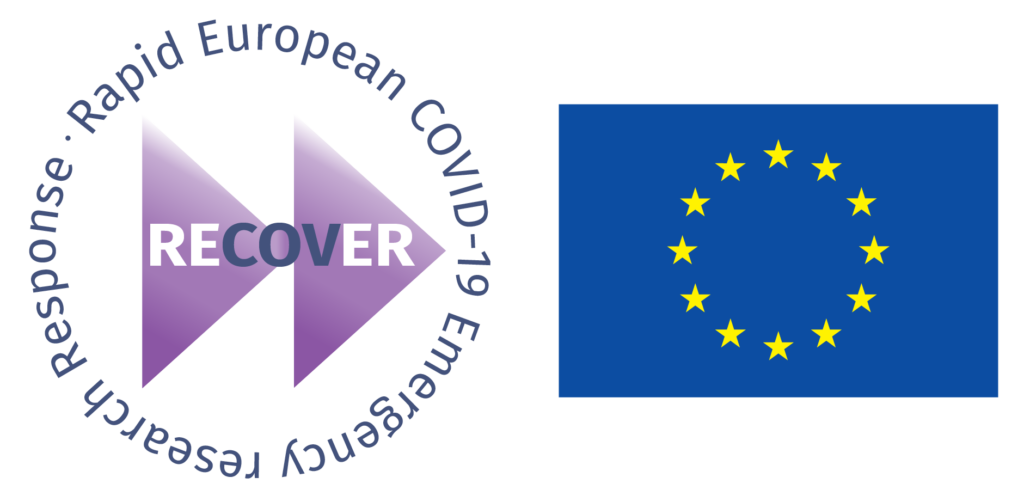17 July 2020
To better understand what working on COVID-19 during the pandemic entails, we have interviewed RECOVER project member Emma Rademaker about her role in the project and day-to-day activities.
What is your role within RECOVER/in the COVID-19 pandemic and what it entails?
I am a PhD Student working for PREPARE, promoted by Professor Marc Bonten and co-supervised by Dr. Lennie Derde. My research is embedded in the ‘Epidemiology of Sepsis and Inflammation’ research group and focuses on severe pneumonia in the Intensive Care Unit (ICU). I am a site coordinator for the REMAP-CAP study in the ICU ward at University Medical Center Utrecht (UMCU), and coordinated the data collection for COVID-19 observational research in the UMCU.
Could you tell us a little bit about the project/work you’re involved in?
I am a site coordinator for the REMAP-CAP study, which makes me the first point of contact for patients or representatives of patients included in the study. Being a site coordinator entails screening all patients that come in for eligibility, answering any questions doctors and nurses on the ICU may have about the study, arranging informed consent and so on. I work with a team of four research nurses and a pharmacology student, who help make sure the study runs smoothly and does not burden doctors and nurses with extra study related tasks.
The COVID-19 pandemic prompted a lot of research questions that required prospective data collection of EHR-data. In the UMCU we started a centralized data registry to ensure researchers from different departments were able to work together and share data instead of everyone starting their own database. This was done in collaboration with ISARIC. We recruited a group of medical students and doctors who, during the COVID-19 pandemic, had to temporarily stop there studies or work and who now had the time to collect data from the EHR. This dataset is currently being used for many observational studies in the UMCU and research collaborations with other (Dutch) hospitals.
My PhD focus is on endotyping and phenotyping of severe pneumonia. This means that within the heterogeneous group of pneumonia patients admitted to the ICU, I am trying to find more homogenous subgroups. To this end, I use machine learning techniques that can find similarities in clinical data. This can be useful because these subgroups may respond differently to treatment. As the scope of my research is ICU pneumonia, COVID-19 has led to the expansion of some of my research projects. For instance, we are currently working on a project using EHR from Dutch ICUs, where we will assess the existence and prevalence of COVID-19 L- and H-ARDS phenotypes.
What is the expected impact of the work you’re doing?
Every site that is doing the REMAP-CAP study has impact for contributing patients, and the impact of the study as a whole is expected to be large.
In the context of COVID-19, what are some of things you’ve found easy/challenging to work with?
Easy to work with?
Everybody was willing to work very hard and to be flexible during these challenging times. For instance, the research nurses changed their work schedule to make sure we could also provide the necessary support for the REMAP-CAP study in the evenings and on weekends. Clinical doctors working in the ICU were still willing to put in the effort to include patients in the study, despite being busy creating whole new ICU wards. Also, medical doctors and students who were less busy than usual, would offer to help with COVID-19 related research.
Challenging to work with?
Not being able to be physically present made certain practical tasks very difficult. E.g. for the REMAP-CAP getting informed consent remotely means you do not have the same in-person interaction with patients or legal representatives you would usually have.
Also, the REMAP-CAP study was quickly and repeatedly adapted throughout the course of the pandemic. Keeping the ICU staff (which expanded with newly trained personnel daily) and research team up to date on these changes an e.g. making sure all new study medication was available on surge capacity beds, whilst working mainly from home, proved challenging.
Do you have any lessons to share for the future?
I think the most important lesson I learned during the COVID-19 pandemic is the value of working together in research. Because for good quality information you need large study populations and by working together different centers can share their expertise. Future patients are much better off with one well carried out study of two thousand patients, then they are with twenty studies of a hundred. Coordinating these collaborations is challenging but is likely well worth it.
About Emma Rademaker

Emma is a PhD student working in the ‘Epidemiology of Sepsis and Inflammation’ research group at the Department of Intensive Care of the UMCU.
Emma studied medicine and clinical epidemiology at the University of Amsterdam, after which she started working as a research coordinator in the UMCU, in the research group of Marc Bonten. She started her PhD on endo-/phenotyping of severe pneumonia in 2018. She has an interest in internal medicine and infectious diseases.
